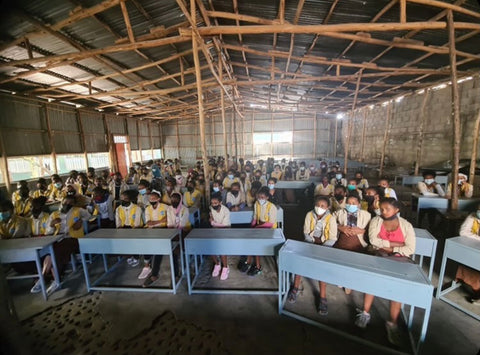For most women access to sanitary products is something taken for granted, but the shocking fact is that a quarter of Ethiopian women often resort to using newspapers or dry grass.
Many women in Ethiopia don’t have access to menstrual products, with a staggering 75% of women unable to afford to use sanitary products during their period.
So what are the factors that cause period poverty in Ethiopia and how can people help?
In our article, we will discuss many of the issues around period poverty and how it affects the daily lives of women in Ethiopia.
Let’s start with the brief before we head into more details.
Period poverty in Ethiopia covers a vast array of difficulties with menstruation. This is not only a lack of education, sanitary products, and cheap hygiene essentials. Women on low incomes or homeless struggle to access adequate washing and waste disposal facilities.
Ok so with the short answer in mind, let’s start by uncovering some of the details of period poverty and find out exactly what it is.
Period poverty
Lack of menstrual hygiene essentialsPeriod poverty is more simply understood as a lack of enough and affordable menstrual hygiene essentials.
It is a serious issue that occurs in developing and poorer countries all around the world including Ethiopia.
“Period poverty is more simply understood as lack of enough and
affordable menstrual hygiene essentials.”
Scarcity of adequate sanitation
It not only describes the lack of education for Ethiopian women around menstruation, It can also relate to scarcity of:
- Sanitary products
- Washing requirements,
- Waste handling, and tools.
- “Period poverty is more simply understood as lack of enough and
- affordable menstrual hygiene essentials.”
Lack of education
In some countries including Ethiopia menstruation is still considered a sign of shame.
So one of the main reasons this important information is withheld from young girls and women is because it’s seen as a threatening condition in Ethiopian culture.
Due to lack of education and income girls find it so hard to approach sanitary products like tampons and pads.
“In some countries including Ethiopia menstruation is
still considered as a sign of shame.”
So what are some of the reasons why this happens in some cultures?
Developing countries
Although we often think of Ethiopia as a country without economic growth, it’s interesting to discover that recently this has not been the case, with experts predicting an even greater increase in their economic situation in the future.
An annual GDP of 11% in the past decade makes Ethiopia stand among the fastest-growing countries in the world.
Gender issues
However, women and young girls are continuously facing critical issues due to gender inequalities which ultimately influence their empowerment, growth, and significant health.
It is the common practice of family members to restrict and take full control of their maturation and evolving sexuality.
According to research by The Ethiopia Young Adult Survey, almost 52% of the girls are forced to get married at the age of 15 and nearly 80% were married at the age of 18.
It’s shocking to discover that these young Ethiopian women don't receive the required and even a basic awareness about menstruation.
It’s encouraging to understand that organizations are stepping forward to work on this particular subject, showing results and real-time deliverables.
So as we've discovered some of the reasons behind period poverty in Ethiopia, let's find out if there are any more important reasons why young women are unable to access the education, sanitary products, and general sanitation that they need.
“young Ethiopian women don't
receive the required or even a basic awareness about menstruation.”
Period poverty in Ethiopia is a complex subject
The roots of period poverty not only in Ethiopia but across the globe, are very complex to understand.
Period poverty is greater in remote or rural areas
Unfortunately, it's greater in remote and rural areas. This is often because it goes unnoticed and undeclared many times.
Encouragingly many organizations are putting effort into rectifying the situation by improving the awareness of primary and secondary and preparatory schools in Ethiopia, in the areas of:
- Reproductive health
- Menstruation menstruation
- Hygiene
This can help millions of women who are not able to obtain the menstrual products that they need, while maintaining their cultural values.
So are there any other factors that contribute to period poverty in Ethiopia?
Read on to discover more...
1. Destitute or low income
Homeless people who struggle to buy food and shelter are more likely to face period-poverty
This is chiefly because food and shelter is thief too priority.
Homeless or those on a low income will also find it difficult to afford and access appropriate washing and disposing of waste facilities.
“The homeless who struggle to buy food and shelter
are more likely to face the poverty period”
2. Unavailability of pads
Another reason for period poverty is that pads and other materials are highly unaffordable and inaccessible.
Some girls have to choose between buying other necessary things and sanitary pads.
As we’ve seen earlier, those women in rural or more remote areas do not have accessibility to menstruation products.
In some of the more deprived rural areas, there is a lack of fully operative toilets with clean water to enable women to access the hygiene required while menstruating.
3. Biased culture
Some of the discriminatory cultural values in Ethiopia make it highly difficult to talk about menstruation and mean many young women feel it necessary to hide their menstruation, as it’s seen as a threatening situation.
For this reason, societies such as Ethiopia aren’t investing the finances necessary to provide the required hygienic facilities.
4. Lack of education
Lack of education is one of the leading causes of period poverty.
Young girls usually remain unaware of the precautions and information of the menstruation cycle as it is rarely taught in school.
“Lack of education is one of the leading causes of period poverty.”
5. Menstrual stigma.
Linked to the lack of education, menstrual stigma plays a huge part in period poverty in Ethiopia.
Its effects vary from place to place but the stigma surrounding menstruation is a serious threat to the dignity of many Ethiopian women.
Many girls isolate themselves during this time of the month and it is a monthly challenge for women and young girls in Ethiopia.
According to experts, In Northeast Ethiopia, only 25% of the girls are able to receive hygienic and menstruation information in schools
Improving period poverty or menstrual health management (MHM) can ultimately positively influence the education, wellbeing, and health of every girl.
And finally…
So we hope to have raised awareness about this growing problem of period poverty in Ethiopia and outlined some of the serious problems young women face every month.
By visiting our store, you are pledging to help women gain access to the education and sanitary products they need in order to remain clean, dignified, and safe while menstruating. Just $5 USD can send a girl in Ethiopia to school for 2-3 years.
A percentage of each purchase goes directly to our partnered charity Lietlicare.org.
See photos shared with us directly from Lielt iCare






